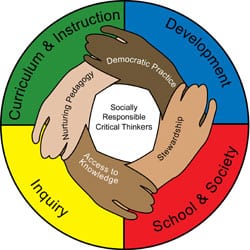School of Education Outcomes - Higher Education Leadership

The Doctor of Education in Higher Education Leadership at Maryville University is constructed around three recurring themes that emerge from the conceptual model. The first of these themes refers to developing leaders who have a deep understanding of the nature and the ethics of leadership in a democratic and global society. The second theme builds on the first and encompasses objectives dealing with developing leaders who are change agents, and who are capable of both initiating positive change and sustaining that change through sound organizational skills and an orientation toward collaborative decision-making. Finally, the third driving theme centers on developing leaders who are reflective learners with the skills to gather information and understand the nature and value of formal inquiry as it leads them to know the organizations they lead and the democratic environment in which those organizations exist.
We believe that educational leaders must lead with vision, strength of conviction, and a firm grounding in the belief that all can learn and grow. We foster a philosophy of leadership that embraces the strengths of all democratic institutions and that provides voice to all participants.
Theme 1 – The Nature and Ethics of Leadership in a Democratic and Global Society
Higher Education Leaders:
- Understand the history, philosophy, and sociology of higher education in a democracy and take reasoned positions on issues and international models of reform and innovation in higher education
- Have a clear understanding of the nature of leadership, of themselves as leaders, of the moral and ethical imperatives of leadership, and a clear grasp of the environment in which higher education leaders function
- Possess knowledge of human differences domestically and globally, relate and lead across differences, and recognize and confront injustice at the institutional and societal level
Theme 2 – Leaders as Agents of Positive and Sustainable Change through Democratic Management
Higher Education Leaders:
- Have the skills to initiate, build, and maintain positive human interactions, develop human potential, build systemic learning communities, build collaborative relationships, operate in rich and diverse cultural settings, and view others as worthy and valuable individuals
- Possess the knowledge and understanding necessary to generate and manage human and fiscal resources effectively; apply appropriate legal and accountability oversight; evaluate programs, faculty, and staff; and comprehend the environmental forces, political directions, and institutional governance processes necessary to successfully lead higher education within its current and changing environment
- Demonstrate an ethic of care for colleagues and students by building effective visions and working relationships across multiple functional areas within higher education institutions
- Promote student learning through articulating and assessing learning-centered practices and linking curricular and co-curricular learning
Theme 3 – Leaders as Reflective Learners Who Appreciate the Value of Formal Inquiry in Understanding the Context of Higher Education in a Democratic Society
Higher Education Leaders:
- Understand, and continuously reflect upon the critical nature of valid data in the decision-making process; apply sound inquiry methodologies and effective technologies; analyze complex data sets, draw strategic conclusions and develop strategic plans, build collaborative work teams, formulate effective implementation plans and evaluate results
- Have a firm grasp of student developmental theory with an emphasis on student resilience, persistence, and retention, and acquire and practice the skills, concepts, and techniques to structure effective instructional environments and interventions that maximize student learning and success
- Demonstrate the ability to perform effective program assessment and strategic problem solving
These themes and the program objectives serve as the basis of the individual course objectives and student competency expectations. These objectives and the attached competencies in turn lay the foundation for both the activities in the internship and the development of the student portfolio and culminating project.